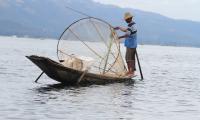Human rights driving sustainable small-scale fisheries

In order to protect and provide access for small-scale fishers to marine resources and markets you need human rights, states new report by the Danish Institute for Human Rights.
SDG 14 : Conserve and sustainably use the oceans, seas and marine resources for sustainable development
SDG target 14. b: Provide access for small-scale artisanal fishers to marine resources and markets.
Many small-scale fishers live in poverty with insufficient income to ensure an adequate standard of living due to adverse impacts of commercialisation, overfishing, climate change and unfair distribution of access to marine resources between large-scale and small-scale fishers. This affects their human rights to work, to food, to an adequate standards of living, among others.
Small-scale fisheries and human rights
Generally, human rights and SDGs are tied together in a mutually-reinforcing way. More specifically, an effective and adequate implementation of SDG target 14.b requires the realisation of a series of human rights. The good news is that human rights monitoring mechanisms have already produced data and recommendations that can guide and drive efficient implementation of SDG target 14.b.
A database from the Institute shows the connection between the SDG, including target 14.b, and human rights data and recommendations.
- In 2019, thematic report of theUN Expert Mechanism on the Rights of Indigenous Peoplesdescribes how climate change and natural disasters have implications for indigenous peoples’ access to marine resources and how they are forcing indigenous peoples to leave their lands
- In 2018,the UN Special Rapporteur on the right to foodvisitedIndonesiaand gaveIndonesia a recommendation toenhance efforts to protect the access of small-scale fisherfolk, men, women and their families, and coastal communities to water resources and integrate a human rights-based approach into laws related to fisheries and fisheries management.
Human rights monitoring can help identify gaps and barriers in access to marine resources for small-scale fishers and help identify vulnerable and marginalised groups within the sector who may need the development of special measures to overcome discriminatory barriers.
Human rights data can complement the work, that is already being done to monitor and reach SDG target 14.b.
“Monitoring human rights data plays a major part in achieving target 14.b. Going forward, it is interesting to see how we can increase the attention of human rights monitoring mechanisms to the situation of small-scale fishers and develop even more human rights-based data in the field to provide access for small-scale artisanal fishers to marine resources and markets.” says Birgitte Feiring.
Human rights monitoring act like a spotlight showing the people who are being discriminated or excluded from marine resources.
A global project
In 2018, the Institute initiated a global project on sustainable oceans in a unique collaboration with organisations across different sectors. The project is funded by the Swedish International Development Agency (Sida). The report is a result of this project.
“We believe that it is difficult to implement target 14.b in an efficient manner that leaves no one behind, unless we use human rights. The report tells us that human rights standards, principles and monitoring mechanisms can help drive the needed change to achieve the target properly,” says Birgitte Feiring, Department Director for Human Rights and Development at the Institute.
Human rights-based approach is the solution
In order to reach target 14.b efficient and leaving no one behind the report argues for a human rights-based approach, which ensures participation, accountability and non-discrimination.
Moreover, National Human Rights Institution (NHRIs) can play a crucial role in upholding and protecting the human rights of small-scale fishers. The report highlights an example from Malaysia.
The Human Rights Commission of Malaysia (SUHAKAM) conducted an outreach programme with fishing communities in the country, and received a complaint from a fishing community regarding planned project to build three man-made islands. As proposed, the project will destroy areas for catching crabs, prawns and fish, meaning that fishermen will have to incur additional time and cost to travel further to catch fish. The local fishing community is concerned that the project will have a range of environmental and human rights impacts. If SUHAKAM finds the project could cause human rights violations, it has the power to refer the matter to appropriate or relevant authorities and make any necessary recommendations.
You can read the full report here.
